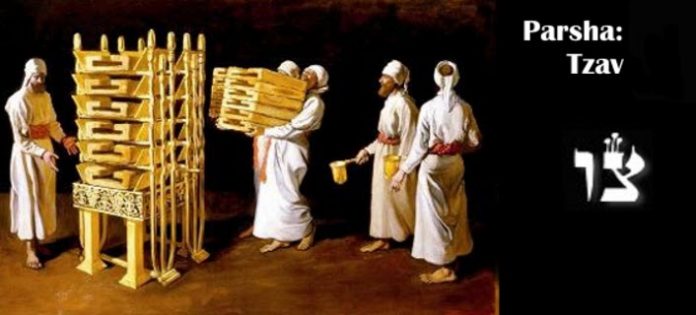Parshat Tzav is the second portion of the book of Leviticus, and it provides instructions to the Kohanim on the procedures for offering sacrifices in the Mishkan. The parsha underscores the importance of sacrifice and service to Hashem, and the role of the Kohanim in facilitating these offerings. This article explores some of the key themes in Parshat Tzav and their relevance in contemporary Jewish tradition.
The Perpetual Flame and the Enduring Commitment to Hashem
The parsha begins with the commandment to the Kohanim to keep the fire on the altar burning at all times. This perpetual fire symbolizes the enduring commitment that Hashem expects from His people. It is a reminder that Hashem is always present, and that our service to Him should never cease. The Kohanim were responsible for ensuring that the fire remained lit and that the altar was prepared for the daily sacrifices.
The perpetual flame is a symbol of the Jewish people’s enduring commitment to Hashem. It represents the idea that our devotion to Hashem should not be sporadic or temporary, but rather constant and unwavering. In Jewish tradition, this commitment is expressed through the observance of mitzvot and the study of Torah. By engaging in these practices, we affirm our relationship with Hashem and express our devotion to Him.
The Role of the Kohanim as Intermediaries between the People and Hashem
One important aspect of the offerings is the emphasis on the Kohanim’s involvement. They are responsible for the preparation and presentation of the sacrifices, highlighting their role as intermediaries between the people and Hashem. The Kohanim must also ensure that the offerings are performed correctly and that they meet Hashem’s standards.
The Kohanim were a central part of the Jewish religious hierarchy, serving as intermediaries between the people and Hashem. They were responsible for conducting the sacrifices, and ensuring that they were performed according to Hashem’s instructions. In contemporary Jewish tradition, the role of the Kohanim has evolved, and they now serve as community leaders and teachers. However, their role as intermediaries between the people and Hashem remains central to Jewish tradition.
The Importance of Sacrifice and Atonement
Another important theme in Parshat Tzav is the concept of atonement. The sin offerings and guilt offerings serve as a means for the people to repent and seek forgiveness from Hashem. Through the sacrifices, the people are able to restore their relationship with Hashem and achieve atonement for their transgressions.
In contemporary Jewish tradition, the concept of atonement remains central. During the High Holidays, Jews seek to repent for their transgressions and seek forgiveness from Hashem. The liturgy of the High Holidays reflects this theme, with prayers for forgiveness and expressions of remorse. The concept of atonement is a reminder of the importance of taking responsibility for our actions, and seeking to repair the harm that we have caused.
The Importance of Purity and Sanctity
The parsha also highlights the importance of the Kohanim’s purity and sanctity. They are required to follow strict guidelines for their personal hygiene and are prohibited from coming into contact with certain impurities. This emphasis on purity reflects the sacred nature of their role as intermediaries between the people and Hashem.
In contemporary Jewish tradition, the concept of purity remains important. The laws of kashrut, for example, reflect the importance of maintaining a pure and holy diet. Similarly, the laws of taharat hamishpacha, which govern family purity, reflect the importance of maintaining a pure and holy family life.
The consecration ceremony of the Kohanim is also described in Parshat Tzav. The ceremony involved a process of purification, followed by the anointing of the Kohanim with special oil. This ceremony symbolizes the special status of the Kohanim as representatives of Hashem and reinforces their role as intermediaries between the people and Hashem.
In contemporary Jewish tradition, the consecration ceremony has evolved, but the concept of sanctity remains important. Rabbis and other community leaders are often ordained through a process of study and examination, which is designed to ensure that they are worthy representatives of the Jewish community.
The Significance of the Sacrificial System
The sacrificial system described in Parshat Tzav is no longer practiced today, as the Temple in Jerusalem was destroyed almost 2000 years ago. However, the concepts and principles underlying the sacrificial system remain important in contemporary Jewish tradition.
The concept of sacrifice reminds us of the importance of devoting ourselves to Hashem, and the role of the Kohanim as intermediaries between the people and Hashem reinforces the idea that we must strive to maintain a close relationship with Hashem. The emphasis on purity and sanctity reinforces the idea that we must strive to live holy and righteous lives, and the concept of atonement reminds us of the importance of taking responsibility for our actions and seeking to repair the harm that we have caused.
Conclusion
Parshat Tzav highlights the importance of sacrifice, service to Hashem, and the role of the Kohanim in facilitating these offerings. The perpetual flame reminds us of the enduring commitment that Hashem expects from His people, and the Kohanim’s role as intermediaries between the people and Hashem reinforces the idea that we must strive to maintain a close relationship with Hashem.
The concept of atonement reminds us of the importance of taking responsibility for our actions and seeking forgiveness from Hashem, and the emphasis on purity and sanctity reinforces the idea that we must strive to live holy and righteous lives.
Although the sacrificial system is no longer practiced, the principles and concepts underlying it remain important in contemporary Jewish tradition. By studying and reflecting on Parshat Tzav, we can deepen our understanding of these important principles and strive to live our lives in accordance with them.












